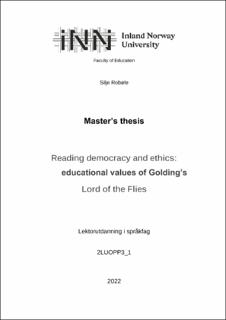Reading democracy and ethics: educational values of Golding’s Lord of the Flies
Master thesis
Permanent lenke
https://hdl.handle.net/11250/3033483Utgivelsesdato
2022Metadata
Vis full innførselSamlinger
Sammendrag
William Goldings roman fra 1954, Lord of the Flies, tematiserer menneskets naturlige ondskap og hvordan et sosialt system bryter sammen. Historien handler om hvordan et samfunn oppstår, og den demonstrerer hva som kan skje når demokratiet trues, samt potensialet for ondskap i mennesker. Lord of the Flies kan dermed brukes i videregående skole for å skape oppmerksomhet rundt disse temaene. Å lære om og være bevisst på demokratiske verdier er viktig å gjøre fra ung alder for å sikre at elevene blir nysgjerrige og aktive deltakere i samfunnet. Å praktisere kritisk tenkning og etisk bevissthet vil gjøre det lettere å stille spørsmål og å kritisk vurdere informasjonen man finner. Å praktisere både demokratiske verdier og etisk bevissthet vil bidra til å forberede elevene til å bli gode medlemmer av samfunnet. Viktigheten av kritisk tenkning og etisk bevissthet er utdypet i kjerneplanen. Denne masteroppgaven benytter en kvalitativ metodisk tilnærming, ved å bruke gjennomgang av eksiterende litteratur, litteraturanalyse og to klasseromsaktiviteter for å finne ut hvilken pedagogisk verdi Lord of the Flies har. William Golding’s 1954 novel Lord of the Flies thematizes man’s natural evil and the breaking of a social system. The story centres around how a society arises, and it demonstrates what can happen when the democracy is put under threat, as well as the potential for evil in humans. Lord of the Flies can thus be used in upper secondary school to bring attention to these topics. To learn about and being aware of democratic values is important to do from a young age to ensure that people become curious and active participants in the society. Practicing critical thinking and ethical awareness will make it easier to ask questions and to critically evaluate the information that one gathers. Practicing both democratic values and ethical awareness will help prepare the pupils to become good members of the society. The importance of critical thinking and ethical awareness is elaborated in the core curriculum. This thesis employs a qualitative methodological approach, by using literature review, literary analysis and two classroom activities to find out what educational value the novel has.
